This review originally appeared in shorter, completely different form on KSNT-NBC, KTKA-ABC, and KTMJ-FOX, Kansas First News. Also: Here is a gang-style on-camera Cloud Atlas review with myself and three other Scene-Stealers contributors.
Oh boy. Where to start?
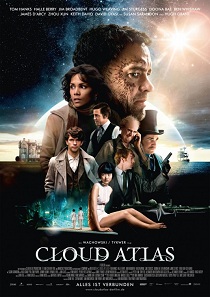 By now, you probably know that Cloud Atlas is an ambitious two-hour-and-45-minute epic starring Tom Hanks, Halle Berry, Jim Broadbent, and Hugh Grant, among others, who each take on multiple roles in six different stories told at once that go as far back as the 1850s and hundreds of years into the future. (Beyond that, I’m not going to summarize the plot because there’s plenty of sites that do that elsewhere.)
By now, you probably know that Cloud Atlas is an ambitious two-hour-and-45-minute epic starring Tom Hanks, Halle Berry, Jim Broadbent, and Hugh Grant, among others, who each take on multiple roles in six different stories told at once that go as far back as the 1850s and hundreds of years into the future. (Beyond that, I’m not going to summarize the plot because there’s plenty of sites that do that elsewhere.)
You’ve also probably heard that this massive juggling act required three directors to wrangle the adaptation of David Mitchell’s novel (where each story is told separately) together: One is Run Lola Run director Tom Tykwer, and the other two are Andy Wachowski and Lana Wachowski, the siblings responsible for The Matrix trilogy and Speed Racer. With all the press surrounding Lana’s recent appearances, you probably also know that she used to be Larry.
That’s as good a place as any to start talking about some of the themes of this sprawling movie, which is equal parts daring, inspiring, and somewhat silly all at the same time. What I wasn’t prepared for was how riveting it is from beginning to end.
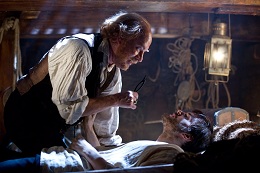 Lana recently accepted the Visibility Award from the Human Rights Campaign for coming out. Meanwhile, the film is being accused of racism for having non-Asian actors play Asian with the aid of makeup. But Cloud Atlas isn’t stereotyping races or casting around them. In fact, by feverishly cross-cutting all six stories and recycling the major cast members as different characters regardless of race or sexual orientation, what Cloud Atlas does is challenge the viewer to look beyond those physical categorizations of things like race and sexual orientation and understand our commonalities as human beings.
Lana recently accepted the Visibility Award from the Human Rights Campaign for coming out. Meanwhile, the film is being accused of racism for having non-Asian actors play Asian with the aid of makeup. But Cloud Atlas isn’t stereotyping races or casting around them. In fact, by feverishly cross-cutting all six stories and recycling the major cast members as different characters regardless of race or sexual orientation, what Cloud Atlas does is challenge the viewer to look beyond those physical categorizations of things like race and sexual orientation and understand our commonalities as human beings.
Hell, if they could have trained a dog to play Tom Hanks, they might have done that as well.
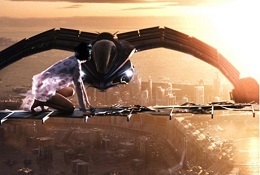 The idea itself isn’t corny. It’s actually quite beautiful. But since the movie has some of the best and worst cinematic makeup transformations ever, it’s easy to poke fun at. Because of this, and the fact that it wears its “we are one” philosophical musings on its sleeve, Cloud Atlas is an easy target.
The idea itself isn’t corny. It’s actually quite beautiful. But since the movie has some of the best and worst cinematic makeup transformations ever, it’s easy to poke fun at. Because of this, and the fact that it wears its “we are one” philosophical musings on its sleeve, Cloud Atlas is an easy target.
Like any go-for-broke cinematic experience, in order for Cloud Atlas to work its magic on you, it requires a certain amount of faith. (Ironic, since the film doesn’t subscribe to any one religious philosophy, but has a definite spiritual quality.) In other words, you have to let your guard down and submit to it. For some, that is easier to do than others. Movies tend to work the best for me when they engage me intellectually and emotionally, and Cloud Atlas certainly does that.
If the stories would have had a more obvious through-line (a comet-shaped birthmark and certain visual motifs are shared), I think it would have been less of a mystery and much of its charm would be lost. On the other hand, it’s the skill with which the directors ratchet up conflict and tension in a traditional way that keeps the movie entertaining and gives it boundless energy.
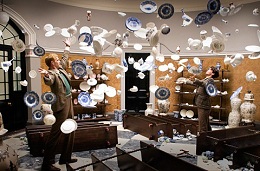 There are references and themes that resonate throughout the dense story of Cloud Atlas, but the stories don’t link up in an obvious way. Rather, they are skillfully intertwined in a way that was almost certainly at least planned in the screenplay, but editor Alexander Berner ought to be given a medal for a seamless overlapping of dialogue and picture that imbue certain moments with a kind of graceful poignancy. I sincerely hope he’s not overlooked come Oscar time.
There are references and themes that resonate throughout the dense story of Cloud Atlas, but the stories don’t link up in an obvious way. Rather, they are skillfully intertwined in a way that was almost certainly at least planned in the screenplay, but editor Alexander Berner ought to be given a medal for a seamless overlapping of dialogue and picture that imbue certain moments with a kind of graceful poignancy. I sincerely hope he’s not overlooked come Oscar time.
The connection between stories is further obscured by the fact that some actors even overlap playing different characters in the same time period, so there’s no way to easily track the progress of one “soul.” In that way, the Wachowskis and Tykwer eschew a banal sort of reading of the material, suggesting that not only are the links between humanity invisible, but they’re also not at all conscious.
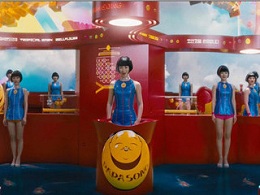 Artifacts, however, that contain ideas are passed down over time through characters—writings, a journal, a set of letters, a video, a movie. If Cloud Atlas’ main theme is to show how people’s ideas and dreams can live on far beyond one’s physical life through a certain “oneness,” then a secondary theme is definitely an argument for art being essential in moving cultures forward.
Artifacts, however, that contain ideas are passed down over time through characters—writings, a journal, a set of letters, a video, a movie. If Cloud Atlas’ main theme is to show how people’s ideas and dreams can live on far beyond one’s physical life through a certain “oneness,” then a secondary theme is definitely an argument for art being essential in moving cultures forward.
A third might be the power of storytelling. One of the best movies of the last 10 years is Terrence Malick’s The Tree of Life. It has similar themes but approaches its material with a more jagged, slice-of-life strategy that elevates the most seemingly mundane moments to part of the great cosmic plan. It does this in a way so challenging and against the grain that it alienates about half of its audience. (This is not a scientific fact, just a personal observation.)
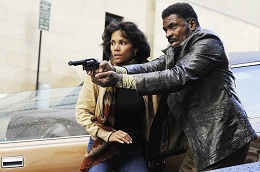 Unlike The Tree of Life, Cloud Atlas doesn’t employ a new, genre-busting narrative style. It actually takes these multiple genres (sci-fi, political thriller, adventure, historical drama, farce) and creates involving stories in a very old-fashioned way. As a whole, the movie is way more than the sum of its parts. Perhaps one or two of these stories would stand on their own as great short films.
Unlike The Tree of Life, Cloud Atlas doesn’t employ a new, genre-busting narrative style. It actually takes these multiple genres (sci-fi, political thriller, adventure, historical drama, farce) and creates involving stories in a very old-fashioned way. As a whole, the movie is way more than the sum of its parts. Perhaps one or two of these stories would stand on their own as great short films.
But together, with the audience subconsciously piecing together their own meaning from the parallel cross-cutting across time and the amazing montage sequences, the viewer can come to its own conclusion about the film’s ultimate meaning. In my mind, the movie all stems from one brave moral choice which one character, played by Jim Sturgess, arrives at organically. You could say it has a ripple effect and that yearning for freedom and equality for all humans reverberates through time.
If this all sounds too heavy for mainstream entertainment, it’s not. Cloud Atlas’ greatest achievement is that the Wachowski siblings and Tom Tykwer keep the viewer grounded.
Cloud Atlas suggests that most of the boundaries that we perceive to exist as human beings—class boundaries, spiritual, racial, gender-related—don’t really exist. It says there is some kind of uniting eternal lifeforce within us all. Sure, it’s not some sort of new or revolutionary idea (John Lennon accomplished the same thing in 3 minutes), but it does so while mounting a gloriously entertaining cinematic mosaic in multiple genres.








Comments on this entry are closed.